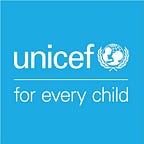Birth registration in Cameroon: A mother’s wish to protect her child’s rights
She may be a young mother to a little girl of 13-months, but Victorine Boundan is categoric when it comes to the importance of birth registration.
“I think that a birth certificate is important because. A child needs one to go to school, and also to be able to work,” Victorine explains.
We are sitting in Victorine’s home in eastern Cameroon. Her baby girl Mercy is hesitant and shy in front of new faces, but she recognises the birth registration agent sitting close by and smiles at him.
In Garga Sarali, the European Union and UNICEF are supporting the Government of Cameroon, specifically the National Civil Status Registration Office, to address the disparities in birth registration. Since 2017, the EU-UNICEF birth registration programme has been training civil registration agents to routinely register all births, including those which take place at home.
Ann-Charlotte Sallmann, focal point for the European Union civil registration programme in Cameroon hopes that increased birth registration rates will contribute to the national reform that has been ongoing in the country since 2010: “Civil registration is a new domain for the European Union in Cameroon. Through our partnership with UNICEF and the Government of Cameroon, we are working on a holistic approach to civil registration,” she said. “This includes training civil registration officers; raising community awareness through civil society organisations; and supporting coordination between key sectors including Ministries of Health, Decentralisation and the National Civil Status Registration Office.”
Every baby born in Cameroon has the right to a free birth certificate within 90 days of birth. This is often not the case. In most case parents for whatever reason parents miss this deadline and often resort a costly process called ‘supplementary judgement’ in which the government requests 4,500 Central African CFA (approximately US$ 7.70) per birth certificate. This is simply too much money for many parents in rural Cameroon.
With funding from the European Union birth registration programme, the process of obtaining a birth certificate for Mercy was straight forward. It was facilitated by a birth registration agent. When Victorine gave birth in the health centre, the nurse completed the declaration of birth with the information to hand. One week later, Victorine’s husband went back to the hospital to give his daughter’s name.
The birth registration agents who have been trained as part of the EU birth registration programme in completing paperwork, reaching out to families on the importance of birth registration, and hand delivering birth certificates to parents on their bicycles and motorbikes, are local heroes ensuring that each child counts in Garga Sarali.
It’s no wonder baby Mercy smiles at the birth registration agent with a sense of familiarity.
